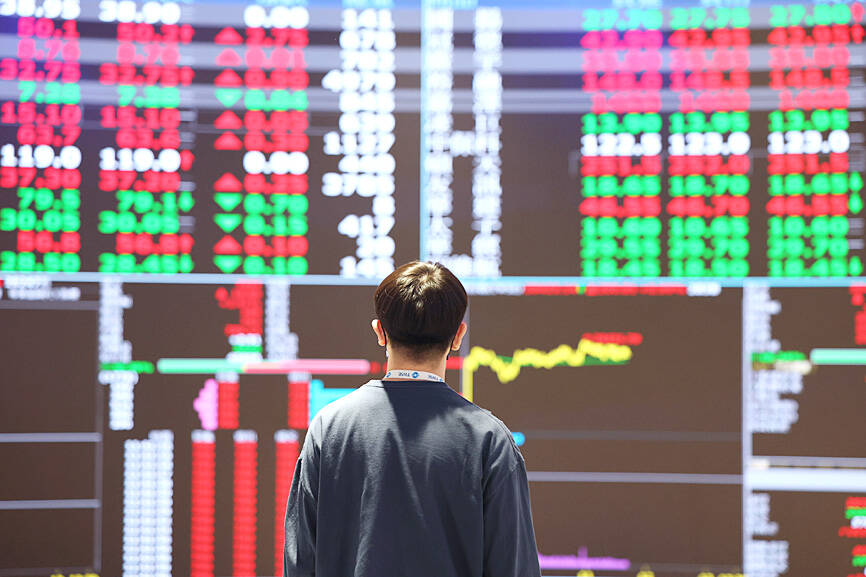The 924 Taiwanese and 80 overseas companies with primary listings on the Taiwan Stock Exchange (TWSE) reported combined pretax profit of NT$3.53 trillion (US$110.05 billion) for last year, down 25.96 percent from NT$4.76 trillion a year earlier, the exchange said yesterday.
The TWSE-listed firms generated NT$36.76 trillion in combined revenue, down 8.82 percent year-on-year from NT$40.31 trillion, the exchange said in a statement.
The decline in pretax profit came as listed companies encountered inventory adjustments amid a volatile and uncertain global economic environment, it said, citing factors such as inflation pressure, interest rate hikes by central banks globally and geopolitical tensions.

Photo: CNA
Listed companies that saw their profit drop last year were mainly those in the shipping, semiconductor and plastics sectors, it said.
However, 427 companies bucked the downtrend by posting gains in pretax profit, especially those in the financial services, automobile, and building material and construction sectors, due to improved market fundamentals, it added.
Financial services providers benefited from positive market conditions, which led to an increase in investment gains and handling fees last year, the TWSE said.
Firms in the automobile sector posted strong bottom lines last year due to improved supply of automotive chips and components, as well as the post-COVID-19 pandemic market boom, while newly completed houses contributed to profit increases in the building materials and construction sector, it said.
Meanwhile, the combined pretax profit of the 819 companies on the over-the-counter Taipei Exchange (TPEX) fell 20.93 percent to NT$265.6 billion last year, while their combined revenue dropped 6.18 percent to NT$2.55 trillion, the smaller exchange said in a separate statement.
The TPEX said that 308 firms posted higher profit than the previous year, led by those in the building materials and construction, financial services and tourism sectors.
Despite the decline in combined pretax profit, there are still many over-the-counter companies with sound fundamentals that deserve investors’ attention, it said, adding that 51 companies’ earnings per share (EPS) exceeded NT$10 and 106 firms’ EPS were between NT$5 and NT$10, while 181 were between NT$2 and NT$5.

Hon Hai Precision Industry Co (鴻海精密) yesterday said that its research institute has launched its first advanced artificial intelligence (AI) large language model (LLM) using traditional Chinese, with technology assistance from Nvidia Corp. Hon Hai, also known as Foxconn Technology Group (富士康科技集團), said the LLM, FoxBrain, is expected to improve its data analysis capabilities for smart manufacturing, and electric vehicle and smart city development. An LLM is a type of AI trained on vast amounts of text data and uses deep learning techniques, particularly neural networks, to process and generate language. They are essential for building and improving AI-powered servers. Nvidia provided assistance

DOMESTIC SUPPLY: The probe comes as Donald Trump has called for the repeal of the US$52.7 billion CHIPS and Science Act, which the US Congress passed in 2022 The Office of the US Trade Representative is to hold a hearing tomorrow into older Chinese-made “legacy” semiconductors that could heap more US tariffs on chips from China that power everyday goods from cars to washing machines to telecoms equipment. The probe, which began during former US president Joe Biden’s tenure in December last year, aims to protect US and other semiconductor producers from China’s massive state-driven buildup of domestic chip supply. A 50 percent US tariff on Chinese semiconductors began on Jan. 1. Legacy chips use older manufacturing processes introduced more than a decade ago and are often far simpler than

STILL HOPEFUL: Delayed payment of NT$5.35 billion from an Indian server client sent its earnings plunging last year, but the firm expects a gradual pickup ahead Asustek Computer Inc (華碩), the world’s No. 5 PC vendor, yesterday reported an 87 percent slump in net profit for last year, dragged by a massive overdue payment from an Indian cloud service provider. The Indian customer has delayed payment totaling NT$5.35 billion (US$162.7 million), Asustek chief financial officer Nick Wu (吳長榮) told an online earnings conference. Asustek shipped servers to India between April and June last year. The customer told Asustek that it is launching multiple fundraising projects and expected to repay the debt in the short term, Wu said. The Indian customer accounted for less than 10 percent to Asustek’s

Gasoline and diesel prices this week are to decrease NT$0.5 and NT$1 per liter respectively as international crude prices continued to fall last week, CPC Corp, Taiwan (CPC, 台灣中油) and Formosa Petrochemical Corp (台塑石化) said yesterday. Effective today, gasoline prices at CPC and Formosa stations are to decrease to NT$29.2, NT$30.7 and NT$32.7 per liter for 92, 95 and 98-octane unleaded gasoline respectively, while premium diesel is to cost NT$27.9 per liter at CPC stations and NT$27.7 at Formosa pumps, the companies said in separate statements. Global crude oil prices dropped last week after the eight OPEC+ members said they would